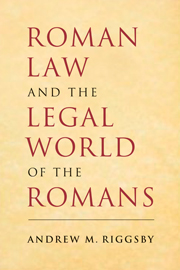Book contents
- Frontmatter
- Contents
- ROMAN LAW AND THE LEGAL WORLD OF THE ROMANS
- 1 Introduction
- 2 Roman History – The Brief Version
- 3 Sources of Roman Law
- 4 Sources for Roman Law
- 5 The Legal Professions
- 6 Legal Education
- 7 Social Control
- 8 Legal (In)equality
- 9 Writing and the Law
- 10 Status
- 11 Civil Procedure
- 12 Contracts
- 13 Ownership and Possession
- 14 Other Rights over Property
- 15 Inheritance
- 16 Women and Property
- 17 Family Law
- 18 Delict
- 19 Crimes and Punishments
- 20 Religious Law
- 21 Law in the Provinces
- 22 Conclusion
- Documents
- Glossary
- Further Reading
- Index
20 - Religious Law
Published online by Cambridge University Press: 05 June 2012
- Frontmatter
- Contents
- ROMAN LAW AND THE LEGAL WORLD OF THE ROMANS
- 1 Introduction
- 2 Roman History – The Brief Version
- 3 Sources of Roman Law
- 4 Sources for Roman Law
- 5 The Legal Professions
- 6 Legal Education
- 7 Social Control
- 8 Legal (In)equality
- 9 Writing and the Law
- 10 Status
- 11 Civil Procedure
- 12 Contracts
- 13 Ownership and Possession
- 14 Other Rights over Property
- 15 Inheritance
- 16 Women and Property
- 17 Family Law
- 18 Delict
- 19 Crimes and Punishments
- 20 Religious Law
- 21 Law in the Provinces
- 22 Conclusion
- Documents
- Glossary
- Further Reading
- Index
Summary
There was no idea in Rome of the “separation of church and state.” During the earliest period of the Roman government, certain priesthoods were the guardians and arbiters of the law. Even after this period, many priesthoods remained state offices; there were many public rituals; and public money was spent on religious buildings and the like. And many have noted the markedly legal cast of Roman religion itself. Rituals, prayers, and responses to prodigies had to take prescribed forms. The “pontiffs” who had originally been guardians of the law in general remained less “priests” in the modern sense than religious lawyers. Hence it is not surprising that religious law was one of the major subcategories of public law in Rome. But other factors limited the reach of religious law. First, on the legal side of things, is the mere fact that divine law was, after that archaic period, a subcategory of public law. The gods, apparently, did not have preferences in most mortal matters, and humans were left to their own devices in these areas. Second, on the divine side, religious authority was decentralized, and orthodoxy was not, in most respects, a Roman goal. Not even clearly religious activity in private homes, for instance, seems to have been of much interest to the authorities. There was some interest in preserving the existence of familial rites, perhaps especially the maintenance of ancestor worship, but there were no uniform regulations for the specific content.
- Type
- Chapter
- Information
- Roman Law and the Legal World of the Romans , pp. 205 - 214Publisher: Cambridge University PressPrint publication year: 2010



